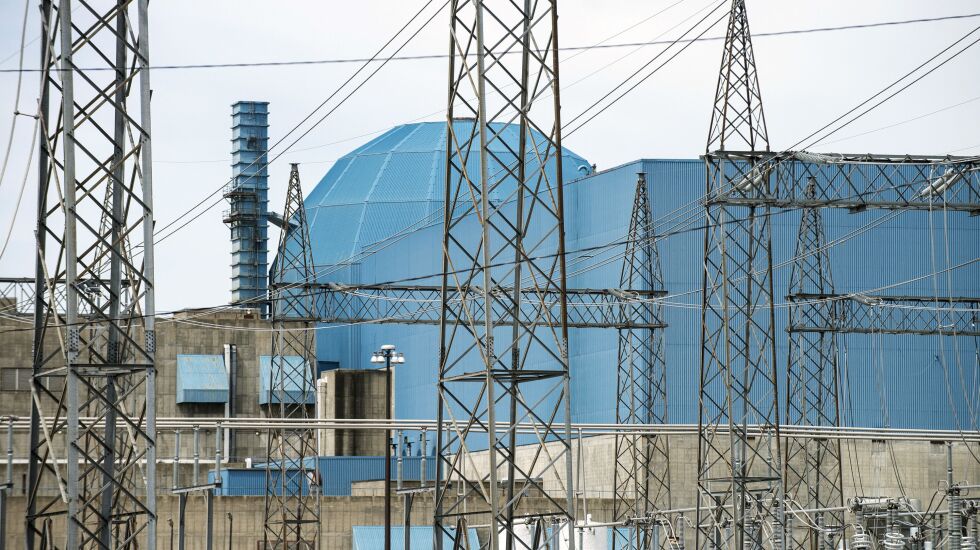
The Illinois General Assembly is scheduled to soon take up bills vetoed this year by Gov. J.B. Pritzker. Among those he vetoed was a bipartisan bill to lift the state’s decades-old moratorium on building new nuclear reactors to generate electricity.
If it stands, his action will contribute to the state’s woefully inadequate response to global warming caused by carbon pollution.
Under the state’s landmark 2021 Climate and Jobs Equity Act, Illinois hopes to have homes and businesses get 40% of our power from carbon-free sources by 2030. In fact, we have reached only a quarter of that — just 10.5%, according to recent news reports — thanks to a slow start to implementing a law hailed two years ago as a monumental achievement in the fight against climate change.
Illinois has a long history of being nuclear friendly with more than 55% of our electricity coming from nuclear plants, which makes Illinois among the largest producers of nuclear power in the U.S.
So why stop now? The burning of fossil fuels continues to warm the planet, creating torrential storms, devastating floods and other catastrophic weather events. NASA reported that this past summer was the hottest since global records began in 1880. Chicagoans got a taste when our heat index reached 116 degrees Fahrenheit in August — the second-highest on record.
It’s true that about a dozen states still ban nuclear reactors. But Alaska, Michigan and Indiana recently passed laws that allow consideration of nuclear power development. Last year, Montana ended its 43-year moratorium on nuclear construction as did West Virginia, which had the ban on its books for 25 years.
When Pritzker struck down Senate Bill 76, he said the definition of “advanced nuclear reactors” was too broad and could open the state up to the development of large-scale generators, which he believes puts communities at risk.
But questions about the safety of nuclear reactors have been put to rest many times over. The U.S. government, Illinois and 27 other states have safely operated nuclear reactors for nearly 45 years. And nuclear plants are much safer than coal-fired plants, which leach toxins into groundwater and spew emissions into the air — a leading cause of death.
A reliable energy source
A recent U.S. Department of Energy report points to the need for carbon-free firm power from advanced nuclear to achieve net-zero carbon emissions in the U.S. by 2050. Unlike renewables such as solar and wind, which depend on sunshine and a strong breeze to generate electricity, nuclear reactors provide firm power, meaning electricity is always there — 24/7, 365 days a year — to power our electricity-intensive lifestyle.
We also see bipartisan congressional support for nuclear technology. Legislation that would reassert America’s leadership in “versatile advanced nuclear” energy technology was approved by the U.S. Senate 86-11 this summer as part of the National Defense Authorization Act.
The ADVANCE Act of 2023 will speed up deployment of new nuclear technologies, strengthen the fuel cycle and supply chain infrastructure, help clean up legacy uranium-contaminated sites on tribal land, and create ways to repurpose former industrial sites for nuclear reactors. Installing a small modular reactor at the site of a closed fossil-fuel plant, for example, carries the advantage of plugging right into the existing electric grid without additional investment or time-consuming permit applications.
In Springfield this summer, the bill to lift the nuclear construction ban garnered more votes — in both the House and Senate — than the three-fifths majority needed to override a veto. I urge Illinois House Speaker Chris Welch to put the nuclear moratorium bill on the agenda during the veto session, which runs from Oct. 24 through Nov. 9.
Lifting the state’s ban on new nuclear power is a good first step to ensure Illinois can quickly decarbonize while still enjoying the safe, reliable and clean energy needed for modern life.
Joe Tedino is a Chicago-based volunteer with Citizens’ Climate Lobby.
The Sun-Times welcomes letters to the editor and op-eds. See our guidelines.
The views and opinions expressed by contributors are their own and do not necessarily reflect those of the Chicago Sun-Times or any of its affiliates.







